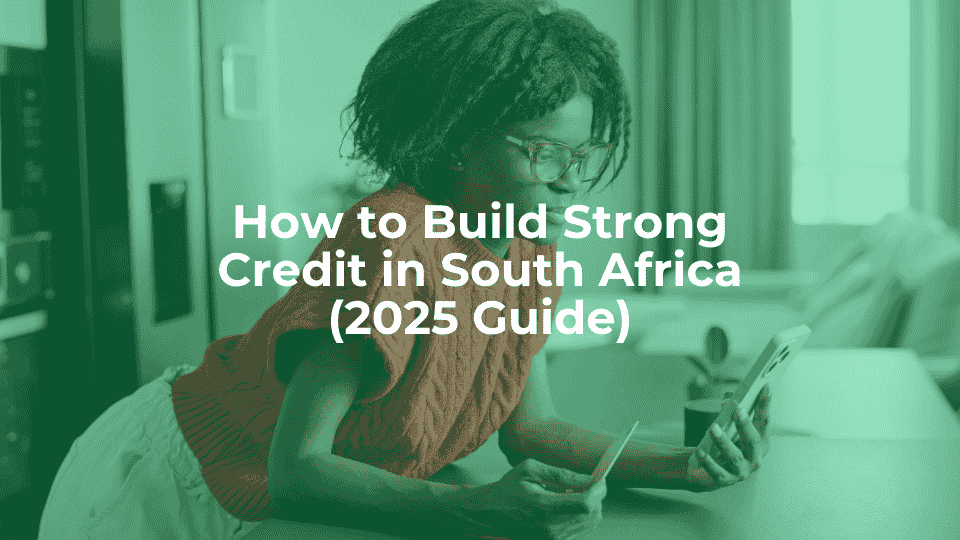How to Build Credit South Africa: A Step-by-Step Guide
October 29, 2025
Why it Matters to Build Credit South Africa
If you’ve ever been declined for a loan, phone contract, or car finance, it’s likely because you need to build credit South Africa lenders can trust. Your credit score is one of the most important indicators of financial health — it shows how reliably you manage money and repay debt.d
Learning to improve and maintain a strong credit record can open the door to lower interest rates, higher limits, and faster approvals from trusted lenders across the country.
💡 Explore credit-friendly loan options at FatCat Loans
What Is a Credit Score and How Is It Calculated?
Your credit score is a 3-digit number (usually between 0 and 999) that represents your financial reliability. It’s calculated using data from credit bureaus like TransUnion, Experian, XDS, and Compuscan.
| Credit Score Range | Status | What It Means |
|---|---|---|
| 0 – 489 | Poor | High risk – often declined |
| 490 – 600 | Fair | Moderate risk – higher interest rates |
| 601 – 720 | Good | Acceptable to most lenders |
| 721+ | Excellent | Strong record – lowest rates available |
Learn more: What Is a Good Credit Score in South Africa?
How to Build Credit South Africa: Step-by-Step
You don’t need to earn a huge income to build a strong score — just consistency, responsibility, and time.
1️⃣ Check Your Current Credit Report
Start by getting a free credit report from a bureau like TransUnion or Experian. You’re entitled to one free report per year in South Africa.
-
Review all accounts listed.
-
Dispute any errors (such as closed accounts still showing as open).
-
Look for any judgments or defaults you can settle.
Tip: Always pay or settle debts before applying for new credit.
2️⃣ Make Payments on Time
This is the most important factor in your credit score. Even one missed payment can drop your score dramatically.
-
Set up debit orders right after your salary is received.
-
If you can’t pay the full amount, pay at least the minimum due.
-
Late payments remain on your record for up to 2 years.
3️⃣ Use Credit Responsibly
You need credit to build credit. The key is to use it wisely:
-
Keep balances below 30% of your available limit.
-
Don’t max out credit cards.
-
Avoid opening too many accounts too fast.
| Credit Type | Good for Building Credit? | Notes |
|---|---|---|
| Credit card | ✅ | Keep utilisation under 30% |
| Retail store account | ✅ | Pay in full monthly |
| Personal loan | ✅ | Shows repayment discipline |
| Multiple micro loans | ❌ | Can harm affordability score |
4️⃣ Keep Old Accounts Open
The age of your credit accounts affects your score. The longer your credit history, the better lenders can gauge your habits.
-
Don’t close older, well-managed accounts unnecessarily.
-
Keep small, regular activity (like small purchases paid off monthly).
5️⃣ Limit Credit Applications
Each new application triggers a hard inquiry that can temporarily lower your score.
-
Only apply for credit when necessary.
-
Use comparison platforms like FatCat Loans instead of multiple direct applications.
6️⃣ Consider a Small Personal Loan to Build Credit
A small personal loan can help you establish repayment history, even if your score is low. Start with manageable amounts like R5,000 – R10,000 and repay on time every month.
| Loan Amount | Suggested Term | Best For |
|---|---|---|
| R2,000 – R5,000 | 3–6 months | Entry-level credit builder |
| R10,000 | 6–12 months | Boosting repayment history |
| R20,000 – R50,000 | 12–24 months | Debt consolidation or long-term record |
See: How to Get a R10,000 Personal Loan with Bad Credit in South Africa
7️⃣ Diversify Your Credit Mix
A healthy credit profile includes different types of accounts (credit card, personal loan, retail account).
-
Don’t overdo it — 2–3 active accounts are enough.
-
The goal is to show you can handle different repayment types responsibly.
8️⃣ Avoid “Loan Stacking” or Overlapping Debts
Taking multiple short-term loans at once can severely damage your affordability and credibility.
Instead, consider debt consolidation — combining multiple debts into one fixed payment:
Timeline: How Long Does It Take to Build Credit South Africa?
| Starting Point | Expected Time to Improve | Tips |
|---|---|---|
| New to credit | 6–12 months | Open one small account, pay on time |
| Poor credit | 12–24 months | Repay small loan & remove defaults |
| Good credit | Ongoing | Maintain low utilisation, avoid late payments |
Consistency is everything — even small, positive actions compound over time.
Common Mistakes to Avoid
-
❌ Applying for too many loans in one month
-
❌ Ignoring debit orders or small missed payments
-
❌ Closing old accounts too early
-
❌ Borrowing from unregistered lenders
-
❌ Not checking your report regularly
Always use registered lenders like those listed at FatCat Loans.
FAQs: How to Build Credit South Africa
Q1. How do I start building credit if I’ve never had any?
Start small — a low-limit credit card or small personal loan is enough to create a payment record.
Q2. How long does it take to build credit South Africa?
Typically 6–12 months of consistent, on-time payments.
Q3. Can bad credit be repaired?
Yes. Pay off defaults, avoid missed payments, and rebuild using smaller, manageable loans.
Q4. Does checking my credit score lower it?
No. Personal checks are considered soft inquiries and do not affect your score.
Q5. Should I pay my debt early?
Yes. Early or on-time payments improve your profile and save on interest.
Q6. Can I still get a loan while rebuilding?
Yes. Some lenders offer bad credit personal loans if you can prove affordability.
See: Bad Credit Loans South Africa
Ready to build credit South Africa lenders trust?
Compare safe, affordable loans from registered lenders that help you grow your financial confidence — all in one place.
👉 Start now at FatCat Loans

The FatCat Loans Editorial Team delivers clear, accurate, and unbiased guidance on loans, credit, and personal finance in South Africa. Our writers follow strict editorial standards to ensure every article is trustworthy, well-researched, and easy to understand, helping readers make confident financial decisions.





